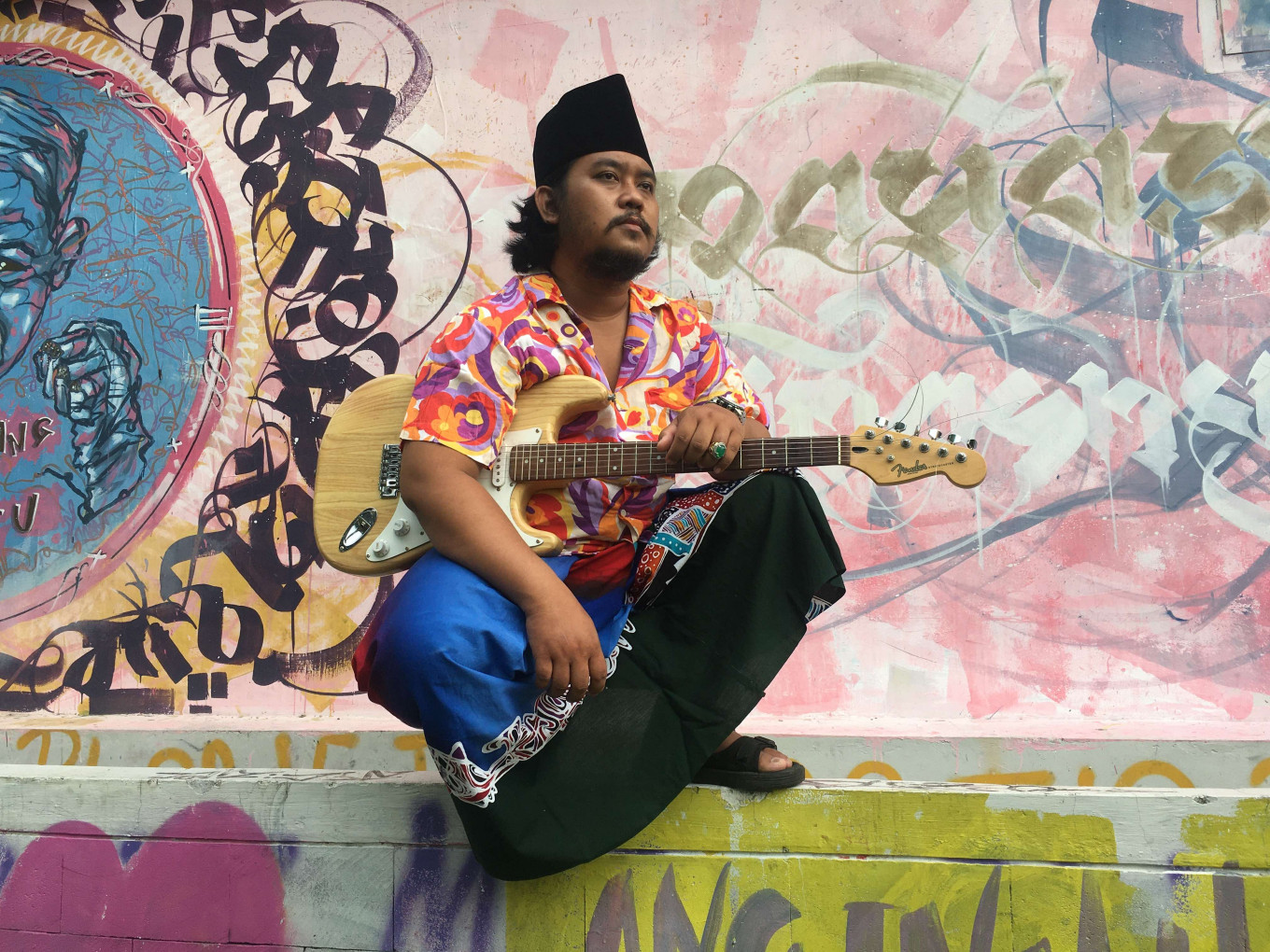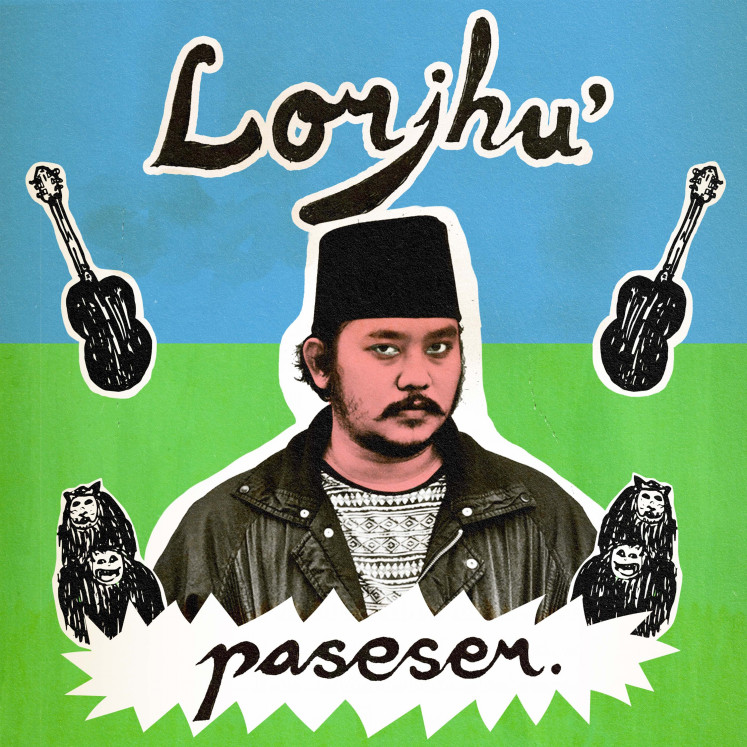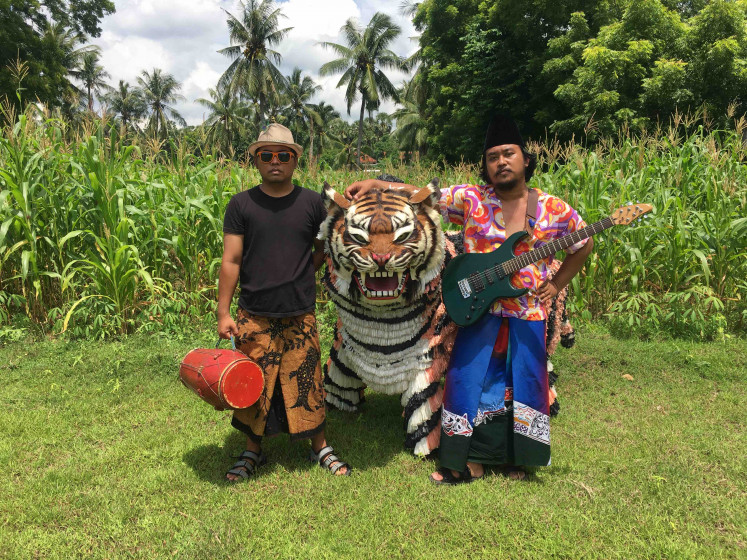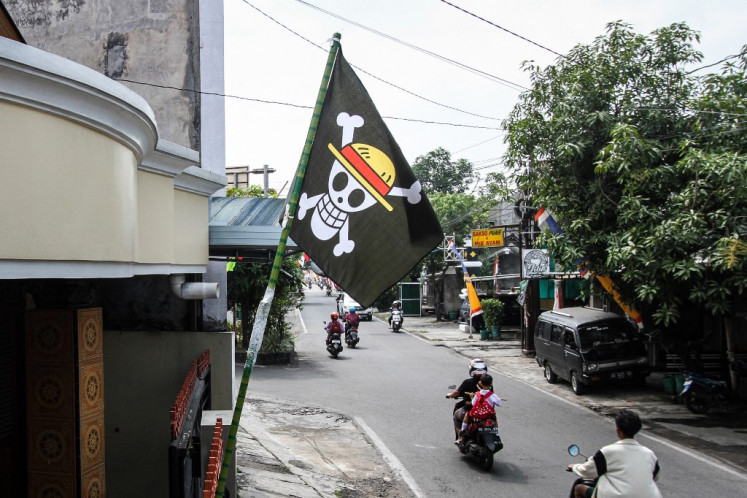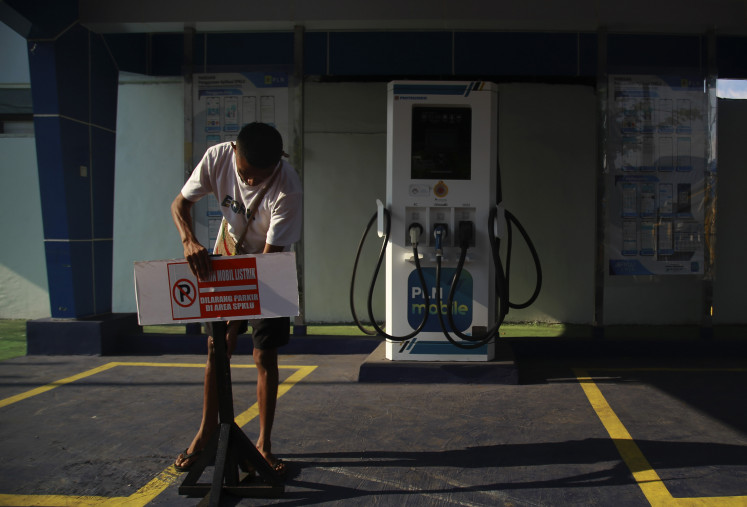Popular Reads
Top Results
Can't find what you're looking for?
View all search resultsPopular Reads
Top Results
Can't find what you're looking for?
View all search resultsPsychedelic guitars, ‘kendhang’ and Madura’s coast: Lorjhu' talks his unique music
Through the moniker Lorjhu’, Sumenep-native Badrus Zeman aims to reconnect with his hometown by writing songs about his unique childhood experience in the coastal Madura.
Change text size
Gift Premium Articles
to Anyone
T
hrough the moniker Lorjhu’, Sumenep native Badrus Zeman aims to reconnect with his hometown by writing songs about his unique childhood experience in coastal Madura, east Java.
The island of Madura, located on the northeastern coast of Java, is mostly known for its salt production and karapan sapi (cow race), but Lorjhu’ — the one-man band of Badrus Zeman, a native Madurese — gives us another reason to talk about the island.
Sung entirely in Madurese, Lorjhu’’s debut album Paseser is a unique blend of contemporary electric guitar-based rock, psychedelic, folk and elements of Madurese traditional music. Released by the popular indie label Demajors Records, Paseser has caught the ears of critics and music lovers alike, making Lorjhu’ one of the most exciting newcomer artists this year.
David Tarigan from Demajors, a DJ and professional vintage Indonesian music archivist, said Lorjhu’’s strong Madurese flavor is unique and rarely heard in the Indonesian popular music scene.
“To make it more interesting, the Madurese flavor is combined with the hipster-friendly ‘world music’ sound that is currently popular, such as the desert blues of Africa or the revival of psychedelic Thai molam music interpreted by western bands such as Khruangbin.”
‘Dangdut’, world music and heavy metal
Born and raised in the small town of Sumenep, Madura island, the 31-year-old Badrus Zeman spent his childhood in Islamic boarding schools, surrounded by dangdut orkes (an orchestral form of the popular Indonesian music genre) and qasidah (Islamic music). His father, grandfather and uncle even performed dangdut together under the name Orkes Bunga Dahlia in the 80s.
During middle and high school, Badrus discovered rock, metal and African music, which all would be major components in his exploration with Lorjhu’.
“I discovered African music purely by chance,” he said. “I bought a Windows laptop and it came with free music, including Habib Koitém, which I ended up loving.”
Having his ears attuned to both traditional and modern music since he was young helped Badrus mix both elements in his music, starting from his very first music project in the 8th grade.
“It was instrumental music, and I was exploring the sounds you can make out of clay water barrels often used in Islamic boarding schools,” he recalled.
Badrus would end up being involved in countless bands and solo projects, playing all kinds of music from punk rock to black metal.
A love letter to hometown
In 2009, Badrus moved to Jakarta to study film at Jakarta Institute of Arts. Now, he teaches film and animation at the very same campus and lives happily with his wife and two-year-old son in the capital.
However, the dramatic contrast between living in a small coastal town of Sumenep and the metropolitan Jakarta is not lost on him. Lorjhu’’s debut album Paseser seems to be Badrus’ attempt to reconnect with his childhood memories, the culture of Madura and his identity as orang pesisir (a coastal native).
“Seventy to 80 percent of the lyrical themes are about my coastal hometown, but through my own personal lenses and experiences,” Badrus said.
The groovy psychedelic number “Lakonah Oreng Manceng”, for example, is about fishing, a common source of livelihood but also a favorite pastime of people back in Badrus’ hometown.
“Fishing is an important daily activity over there, and it takes the entire day. People would leave for the sea during sunrise and come back in late afternoon, doing nothing but fishing,” Badrus explained. “There’s this element of hope of getting a desirable outcome, and the determination to go out there and get as many fish as possible; that’s what the song is about.”
Literally meaning “down” or “go down”,“Toron” is a folky song about Madureses’ mudik (homecoming) tradition, usually during the Idul Fitri holiday, and Badrus’ longing to go home, something that he did not get to do during the pandemic.
“When you migrate out of Madura, we call that ‘going up’ and when you come home that’s ‘going down’. The analogy is as if you’re climbing a tree — after you pick the fruit and make something out of yourself, you go back down,” Badrus said. “Toron is a tradition of Madurese people, and more than just about coming home. It's about meeting your family and friends.”
But perhaps the best representation of Lorjhu’’s energy is the lead single “Can Macanan,” an anthemic track with memorable guitar solos and a bouncy feel, featuring Rifan Khoridi, a fellow Sumenep on kendhang (traditional percussion).
“Can Macanan” refers to Madura’s version of the lion dance, a tradition that excited Badrus as a kid.
“Back then, we didn’t have gadgets or anything, so whenever we heard noises in the street, we’d go out. It’s usually either can macanan or a marching band. It’s something that I can never forget,” Badrus said.
Childhood memory: 'Can Macanan' refers to Madura's version of the lion dance, a tradition that excited Badrus as a kid. (Courtesy of Lorjhu') (Courtesy of Lorjhu'/Courtesy of Lorjhu')Smartphone magic
Out of nine tracks on the album, only one song was recorded in the studio, while the rest were recorded by Badrus using his smartphone. He also did most of the mixing himself. He said he did it out of necessity.
“I didn’t have a lot of gears, just a guitar, a cable and a signal converter. I didn’t have the funds to go full studio, and even that one track [“Nemor”] was recorded at a friend’s studio, so I didn’t have to pay,” he said. “The rest were recorded on my smartphone, which I mixed using BandLab.”
All Lhorju’’s music videos were also shot using a smartphone, although for different reasons. Being a lecturer in film, Badrus wanted to challenge himself and give Lhorju’ a more raw approach.
“I want the music videos to look like they were shot using a smartphone, as opposed to people using a smartphone to emulate more expensive cameras,” he explained. “If it doesn’t look HD, it’s not a problem; what matters is maintaining Lhorju’’s identity across the board.”
Putting Madura on the map
In December 2021, Lorjhu’ played a radio show with a minimal three-person line-up: one guitar-and-vocal, one on sequencer and a percussionist; but Badrus hopes that, moving forward, he will have the opportunity to perform as a full band, with authentic Madurese musicians on stage with him.
“I want my Madurese friends to get the opportunity to showcase their talents outside of Madura, in front of different crowds,” he said.
Badrus recognizes a big problem that many musicians in Madura — and most likely, other areas far from big cities in Indonesia — face: access, and lack of platforms to promote or showcase their work.
“My hometown Sumenep is the easternmost regency in Madura, while Bangkalan is the farthest west and the closest to Surabaya; so it has more access and a better ecosystem,” he said. “The music scene is there, but there’s a lack of platforms to showcase the music to a bigger and wider audience.”
Badrus wants to use the recent modest success of Lhorju’, at least in terms of market distribution and awareness, as encouragement for more Madurese artists to follow suit. He also personally assists other bands from Madura or other areas to get their music out there.
“It’s like being a consultant,” he said, laughing, “But I like it, because it needs to be done. I want my friends in Madura to get better and bigger; I don’t want to be out here by myself.”

